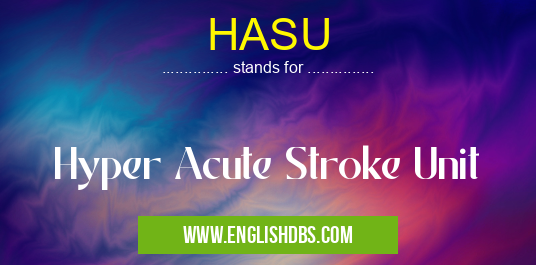What does HASU mean in NEUROLOGY
HASU stands for Hyper Acute Stroke Unit. It is a specialized medical unit within a hospital that provides immediate and intensive care to patients who have suffered a stroke.

HASU meaning in Neurology in Medical
HASU mostly used in an acronym Neurology in Category Medical that means Hyper Acute Stroke Unit
Shorthand: HASU,
Full Form: Hyper Acute Stroke Unit
For more information of "Hyper Acute Stroke Unit", see the section below.
What is a Stroke?
A stroke occurs when blood flow to a part of the brain is interrupted, causing brain cells to die. This can lead to a wide range of symptoms, including sudden weakness or numbness on one side of the body, difficulty speaking, loss of vision, and dizziness.
Importance of HASUs
HASUs play a crucial role in improving the outcomes of stroke patients by providing timely and expert care. They are staffed by a team of highly trained medical professionals, including neurologists, nurses, and therapists.
Services Provided by HASUs
- Rapid assessment and diagnosis of stroke using advanced imaging techniques
- Administration of thrombolytic therapy to dissolve blood clots in the brain
- Monitoring and management of vital signs, including blood pressure and heart rate
- Rehabilitation and support to help patients regain lost functions
- Education and counseling for patients and their families
Benefits of HASUs
- Improved survival rates for stroke patients
- Reduced risk of long-term disabilities
- Enhanced quality of life after a stroke
- Access to specialized care and expertise
Essential Questions and Answers on Hyper Acute Stroke Unit in "MEDICAL»NEUROLOGY"
What is a Hyper Acute Stroke Unit (HASU)?
A HASU is a specialized unit within a hospital dedicated to providing immediate and intensive care for patients experiencing an acute stroke. It typically has a multidisciplinary team of stroke specialists, including neurologists, nurses, and therapists, who work together to diagnose and treat patients with strokes as quickly and effectively as possible.
Who is eligible for admission to a HASU?
Patients with suspected or confirmed acute stroke symptoms, such as sudden weakness or numbness on one side of the body, difficulty speaking or understanding speech, or vision problems in one eye, are eligible for admission to a HASU.
What are the benefits of being treated in a HASU?
Treatment in a HASU offers several benefits, including:
- Rapid diagnosis and treatment, which can improve outcomes and minimize long-term disability.
What does the treatment in a HASU involve?
Treatment in a HASU typically involves:
- Comprehensive evaluation, including physical examination, imaging tests, and laboratory tests.
What is the typical length of stay in a HASU?
The length of stay in a HASU varies depending on the severity of the stroke and the patient's progress. On average, patients stay in a HASU for 1-2 days.
How can I find a HASU near me?
To find a HASU near you, you can consult your physician, search online for stroke centers in your area, or contact your local hospital for more information.
Final Words: HASUs are essential components of stroke care, providing specialized and timely treatment to improve the outcomes of stroke patients. By recognizing the symptoms of stroke and seeking immediate medical attention, patients can benefit from the life-saving and life-changing services offered by HASUs.
HASU also stands for: |
|
| All stands for HASU |
